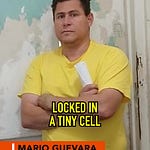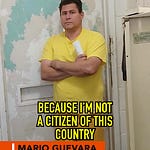By Nick Valencia | September 9, 2025
THE EVERGLADES FLORIDA— The detention machine grinds on at the Dave Collier Training and Transition Airport (TNT). Behind the fences of the place better known for it’s nickname, migrant detainee transfers are still underway at Alligator Alcatraz.
Alligator Alcatraz is a place where court acquittals don’t mean freedom. It’s a spider web of fear and loathing where taxpayer dollars fuel a system built to keep people locked in limbo.
Pennsylvania schoolteacher “Angela” knows this system all too well. Since August 13, she has tracked her undocumented husband through 14 detention centers across multiple states and territories.
“Even though we’re married and he’s been a resident of Pennsylvania for almost 30 years, he’s never had a pathway,” Angela said.
A 1996 law stripped pathways to status and made re-entry a federal felony, giving people like Angela’s husband no real chance.
So, after nearly 30 years in Pennsylvania, 23 years of marriage, and steady work—Angela’s husband remained vulnerable all because of the Illegal Immigration Reform and Immigrant Responsibility Act (IIRIRA).
She remembers the moment that should have been their reprieve: a federal jury declared him not guilty of illegal re-entry.
Instead of walking free, an ICE official told him that he needed to turn himself in.
“Immediately after that trial, ICE wrapped him up again. And since then, he has been detained by ICE with no hearings, no meetings, no credible fear meetings, certainly no bond.”
These last four weeks since he was taken into custody has taken a toll. On everyone involved.
“He’s very scared, he’s probably worried about what’s happening to his family, and he’s using every ounce of his strength to not become a casualty…" family friend Mike Hoffman said.
The U.S marine and combat war veteran has been helping navigate his friends red-tape.
"The government has given us no choice at this moment but to speak for him. And I have no doubt in my mind that he wants to be an advocate for all the others that aren’t as fortunate as him.”
A Shell Game With Lives
Mike Hoffman says the only reason Angela's husband hasn’t been lost entirely is because of her relentlessness.
“Only through the due diligence of his wife. Truly through detective work, she’s been able to find him.”
Angela’s husband has an army of support, for which he is grateful. But for others like him, the battle through the complex system can be lonely.
South Florida based immigration attorney Evelyn Alonzo has seen clients arrested for little more than lacking a driver’s license end up in Alligator Alcatraz.
“They’re not the most dangerous, as the government stated… These individuals got randomly moved to other states. So talk about the right to counsel, the right for you to talk to your client. They just get moved randomly. So then you have to randomly find them.”
It is, Alonzo said, a shell game.
Families spend weeks chasing paper trails as detainees disappear from one jurisdiction to another. Sometimes, those who want to leave can’t. Judges refuse to hear bond cases because the government hasn’t “started” them. Deportations stall without explanation. And even those willing to self-deport are stuck waiting for their turn, lingering in detention.
Angela calls the ordeal not only cruel, but wasteful. Each transfer of her husband — Pennsylvania to St. Thomas, to Puerto Rico, to Florida and back again — comes with a price tag paid by taxpayers and collected by private contractors like Group Infrastructure.
“I don’t think the American people understand what their tax money is actually being used for,” she said.
Hoffman is more blunt:
“There’s such a big price tag on the detainees that people are making hand-over-fist money. And part of the problem here is we’re talking about people who have not been convicted of crimes.”
“What is the cost of holding somebody who has proven that they’re compliant, decades of no criminal history, not a flight risk, when they could be at home, still working, and making their court date?” Hoffman asked. “That cost is hundreds of millions of dollars.”
Business, Not Justice
For Angela, the most painful realization is that none of this feels personal. Her husband has been detained alongside Albanians, Canadians, Cubans, white men and women who share the same fate.
“Sometimes someone on the inside has the guts to help in the smallest of ways, but it’s enough. Overwhelmingly, people are still good.
"How can you not take this personally?" I asked, sincerely.
"Because… we’re just another family," Angela said.
That business dehumanizes everyone it touches.
“This is dehumanizing to the officials — and I’m not just talking about ICE, but for higher people — as it is for the detainees,” Angela said.
"I don’t feel targeted at all. Because in the end it’s really not personal. It’s about finding a reason to fill up the detention centers with as many people as possible in order to make money. And so I don’t — it’s business.”
In the Everglades, the fences of Alligator Alcatraz still stand, proof America's immigration system is not built to correct itself. It is built to endure, to expand, to swallow lives whole.
To hope that we either get tired, do nothing, or worse, forget.









